
AIMS Microbiology
Scope & Guideline
Unlocking the mysteries of microbes, one study at a time.
Introduction
Aims and Scopes
- Microbial Ecology and Health:
Research exploring the interactions between microbes and their environments, particularly regarding human health, gut microbiota, and disease mechanisms. - Biotechnology and Application of Microorganisms:
Studies aimed at harnessing microbes for biotechnological applications, including the production of enzymes, biopolymers, and antibiotics. - Environmental Microbiology and Pollution Remediation:
Investigations into the role of microbes in environmental processes, pollution control, and bioremediation strategies. - Plant-Microbe Interactions:
Research on beneficial plant-associated microorganisms, including endophytes and mycorrhizae, focusing on their roles in enhancing plant health and resilience. - Antimicrobial Resistance and Pathogen Characterization:
Studies investigating the prevalence and mechanisms of antimicrobial resistance among pathogenic microorganisms, including clinical and environmental isolates. - Microbial Metabolism and Bioactive Compounds:
Exploration of microbial metabolism, including fermentation processes and the production of bioactive compounds with potential health benefits.
Trending and Emerging
- Microbiome Research and Human Health:
An increasing focus on the human microbiome's role in health and disease, particularly in areas like gut health, mental health, and metabolic disorders. - Sustainable Agriculture and Biocontrol Agents:
Growing interest in using microbial agents for sustainable agriculture, including biopesticides and biofertilizers, driven by the need for environmentally friendly farming practices. - Nanotechnology in Microbiology:
Emerging studies on the application of nanomaterials for antimicrobial purposes and bioengineering, showcasing innovative approaches to combat microbial infections. - Antimicrobial Resistance Mechanisms and Solutions:
Heightened attention on understanding the mechanisms behind antimicrobial resistance and the development of novel strategies to combat resistant pathogens. - Microbial Applications in Bioremediation and Bioeconomy:
A trend towards using microbes for environmental remediation and waste management, demonstrating their potential in supporting a circular bioeconomy.
Declining or Waning
- Traditional Antibiotic Discovery:
Research focused on discovering new antibiotics through traditional methods is waning, likely due to the increasing interest in alternative approaches such as phage therapy and the use of bacteriocins. - Single-Microbe Studies:
Studies concentrating solely on individual microbial species without considering their ecological interactions are becoming less common as the field moves towards more holistic approaches involving microbial communities. - Basic Microbial Physiology:
While foundational studies in microbial physiology remain important, there is a noticeable decline in publications solely focused on basic physiological research without direct applications or implications. - Microbial Diversity Surveys without Functional Context:
While microbial diversity remains a popular topic, studies that only catalog microbial species without linking them to functional outcomes or ecological roles are decreasing.
Similar Journals
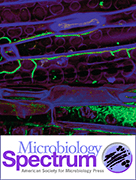
Microbiology Spectrum
Leading the charge in microbiology and immunology research.Microbiology Spectrum is a prominent peer-reviewed journal published by the American Society for Microbiology, dedicated to advancing the field of microbiology through the dissemination of high-quality research. Since its inception in 2013 and continuing until 2024, the journal has established a strong presence in key domains such as microbiology, immunology, cell biology, and ecology, achieving impressive quartile rankings including Q1 in Infectious Diseases and Q1 in Immunology and Microbiology as of 2023. With an emphasis on open access to its scholarly content, Microbiology Spectrum aims to foster collaboration and knowledge sharing among researchers, professionals, and students alike. The journal's scope encompasses a diverse range of topics pertinent to the field, making it an essential resource for anyone involved in microbiological research and its applications. Researchers looking to publish their findings in a respected journal will find Microbiology Spectrum's robust impact factor and Scopus rankings serve as testament to its significance and influence within the academic community.
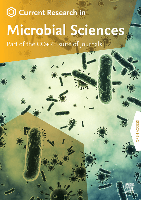
Current Research in Microbial Sciences
Pioneering Research for a Healthier TomorrowCurrent Research in Microbial Sciences is a distinguished peer-reviewed journal published by Elsevier, focusing on the dynamic and rapidly advancing fields of microbiology and infectious diseases. With an ISSN of 2666-5174, this journal has established itself as an essential resource for researchers, professionals, and students alike, offering the latest findings and insights from 2020 to 2024. The journal holds a significant position in the academic landscape, achieving a Q2 ranking across multiple categories, including Immunology and Microbiology, Infectious Diseases, and Medical Microbiology, demonstrating its impact in these critical areas of study. With impressive Scopus rankings—such as being placed in the 94th percentile for Immunology and Microbiology—current research is well-supported by a thriving scientific community. Although the journal is not open access, it serves as a vital platform for disseminating high-quality research and fostering collaboration within the microbial sciences. Engaging with this journal enables professionals and researchers to stay abreast of innovations and contribute to the collective body of knowledge that shapes our understanding of microbial interactions and infectious diseases.

JOURNAL OF MICROBIOLOGY AND BIOTECHNOLOGY
Exploring the Synergy of Microbiology and BiotechnologyJOURNAL OF MICROBIOLOGY AND BIOTECHNOLOGY, published by the Korean Society for Microbiology and Biotechnology, is a premier academic journal based in South Korea that has been at the forefront of advancing knowledge in the fields of microbiology, biotechnology, and their applied sciences since its inception in 1991. This journal holds a commendable Q2 quartile ranking in key categories, including Applied Microbiology and Biotechnology, showcasing its significant impact within the academic community. With an emphasis on high-quality, peer-reviewed research, the journal aims to disseminate innovative findings that foster deeper understanding and advancements in microbial and biotechnological sciences. Researchers, professionals, and students utilize this journal to stay informed about contemporary developments and to inspire future investigations. Although it is not an open-access journal, its content is accessible through various academic libraries and databases, providing a vital resource for those engaged in cutting-edge research.

Frontiers in Microbiology
Pioneering Research for a Healthier TomorrowFrontiers in Microbiology is a leading open-access journal published by Frontiers Media SA, available since 2010, and based in Switzerland. As a prominent platform for innovative research, it specializes in microbiology and medical microbiology, marked by its impressive Q1 classification in the respective fields, reflecting its significant impact and relevance in advancing microbial sciences. With a Scopus ranking of 49th in Microbiology and 41st in Medical Microbiology, this journal is positioned among the top-tier publications, catering to a diverse audience of researchers, professionals, and students. The journal aims to disseminate groundbreaking findings and foster discussions that drive the field forward, ensuring a comprehensive coverage of microbiological studies, from basic research to applications in healthcare and beyond. Enjoy unrestricted access to cutting-edge articles that contribute to both theoretical and applied aspects of microbiology, enriching the scientific community's knowledge base.
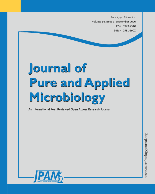
Journal of Pure and Applied Microbiology
Unlocking the Potential of Microbiology for AllJournal of Pure and Applied Microbiology, published by DR M N KHAN, is an esteemed Open Access journal that has been dedicated to advancing the frontiers of microbiological research since its inception in 2007. Located in Bhopal, Madhya Pradesh, India, this journal presents a platform for researchers and professionals in the fields of Applied Microbiology and Biotechnology, offering insights that span a diverse range of topics critical to both scientific progress and industrial applications. As of 2023, the journal is categorized in the Q3 and Q4 quartiles, demonstrating its relevance and growing impact within the community—ranking #219 in Biochemistry, Genetics and Molecular Biology and #93 in Immunology and Microbiology. With an emphasis on accessibility, the journal has embraced an Open Access format since 2017, allowing for a wider dissemination of knowledge. By publishing high-quality research, the Journal of Pure and Applied Microbiology plays a pivotal role in fostering innovation and collaboration among researchers, students, and industry professionals alike.
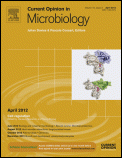
CURRENT OPINION IN MICROBIOLOGY
Connecting researchers with cutting-edge microbiological knowledge.CURRENT OPINION IN MICROBIOLOGY is a prestigious academic journal published by CURRENT BIOLOGY LTD, dedicated to advancing the field of microbiology through timely and insightful reviews. With an ISSN of 1369-5274 and an e-ISSN of 1879-0364, this journal has established itself as a leading source of knowledge in various subfields, consistently achieving a Q1 ranking in Infectious Diseases and Microbiology for 2023. Operating from the United Kingdom, CURRENT OPINION IN MICROBIOLOGY serves a critical role for researchers, clinicians, and students alike by disseminating groundbreaking findings and fostering discussions that shape the future of microbiological research. The journal's rigorous selection process ensures that only high-quality articles are published, reflecting its strong impact factor and high percentile rankings across relevant Scopus categories. Although it does not follow an open-access model, its comprehensive scope and valuable contributions to the medical and scientific community underscore its importance as an essential resource for advancing our understanding of microbial sciences.

CANADIAN JOURNAL OF MICROBIOLOGY
Championing Excellence in Microbial ScienceThe Canadian Journal of Microbiology, published by Canadian Science Publishing, is a well-respected journal established in 1954 that serves as a vital platform for advancing knowledge in the fields of microbiology and related disciplines. With an ISSN of 0008-4166 and an E-ISSN of 1480-3275, this journal is recognized for its rigorous peer-review process and its commitment to disseminating high-quality research that spans applied microbiology, biotechnology, genetics, immunology, and more. Currently indexed in several prestigious databases, its impact factor and category quartiles highlight its significance, ranking in the top tiers of applied microbiology and biotechnology as well as other intersecting fields. The journal provides an essential resource for researchers, professionals, and students seeking to stay informed on the latest advancements and breakthroughs, facilitating collaboration and innovation in the microbiological sciences. Set in the dynamic landscape of academia from its headquarters in Ottawa, Canada, the Canadian Journal of Microbiology remains steadfast in its mission to promote research that addresses key challenges and opportunities within the microbiological community.
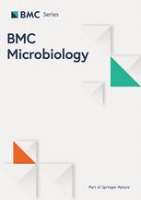
BMC MICROBIOLOGY
Fostering collaboration in the ever-evolving field of microbiology.BMC Microbiology is a leading open access journal published by BMC, dedicated to advancing the field of microbiology since its inception in 2001. With an ISSN of 1471-2180, this journal provides a vital platform for researchers, professionals, and students to share and access high-quality research and innovation in both general and medical microbiology. Based in the United Kingdom, BMC Microbiology holds a commendable Q2 ranking in both various microbiological categories according to the 2023 Scopus rankings, indicating its strong influence in the microbiological community, with a rank of #47 out of 140 in Medical Microbiology and #62 out of 182 in general Microbiology. The journal's commitment to open access ensures that groundbreaking research is freely available to facilitate collaboration and knowledge sharing among the global community of microbiologists. With a focus on publishing original research, reviews, and case studies, BMC Microbiology plays a critical role in disseminating information that can impact health and environmental conditions around the world.
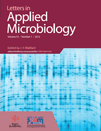
LETTERS IN APPLIED MICROBIOLOGY
Elevating Knowledge in Applied MicrobiologyLETTERS IN APPLIED MICROBIOLOGY, published by OXFORD UNIVERSITY PRESS, is a prominent journal in the field of applied microbiology, serving as an essential platform for researchers and professionals to disseminate innovative findings. With an ISSN of 0266-8254 and an E-ISSN of 1472-765X, this peer-reviewed journal has been contributing to the scientific community since 1985 and continues to engage with cutting-edge research through 2024. With its current Scopus ranking placing it in the 45th percentile of its category, specifically at rank #70 out of 127 in the Applied Microbiology and Biotechnology field, it underscores its significance in advancing knowledge and applications pertinent to microbial science. Although it is not open access, LETTERS IN APPLIED MICROBIOLOGY offers comprehensive insights aimed at enhancing the understanding of microbiological phenomena in practical scenarios, making it a valuable resource for both seasoned experts and emerging scholars.

JOURNAL OF INDUSTRIAL MICROBIOLOGY & BIOTECHNOLOGY
Pioneering Discoveries in Applied Microbiology and BioengineeringJOURNAL OF INDUSTRIAL MICROBIOLOGY & BIOTECHNOLOGY, published by Oxford University Press, is a vital resource for researchers and professionals actively engaged in the fields of applied microbiology, biotechnology, and bioengineering. With an ISSN of 1367-5435 and E-ISSN of 1476-5535, this journal has established itself as a leading platform for disseminating innovative research findings and advancing knowledge in industrial microbiology since its inception in 1996. As of 2023, it is classified in the Q2 quartile across multiple categories including Applied Microbiology and Biotechnology, Bioengineering, and Medicine, underscoring its significance in the academic community. Notably, it ranks 26th of 127 in Applied Microbiology and Biotechnology, placing it in the 79th percentile, indicative of its high impact and influence. Although it does not currently offer Open Access, it remains a key outlet for high-quality scholarly articles that align with the objectives of improving industrial practices through biotechnological applications. For those interested in the latest developments and methodologies within the realm of applied microbiology and biotechnology, this journal serves as an indispensable reference.